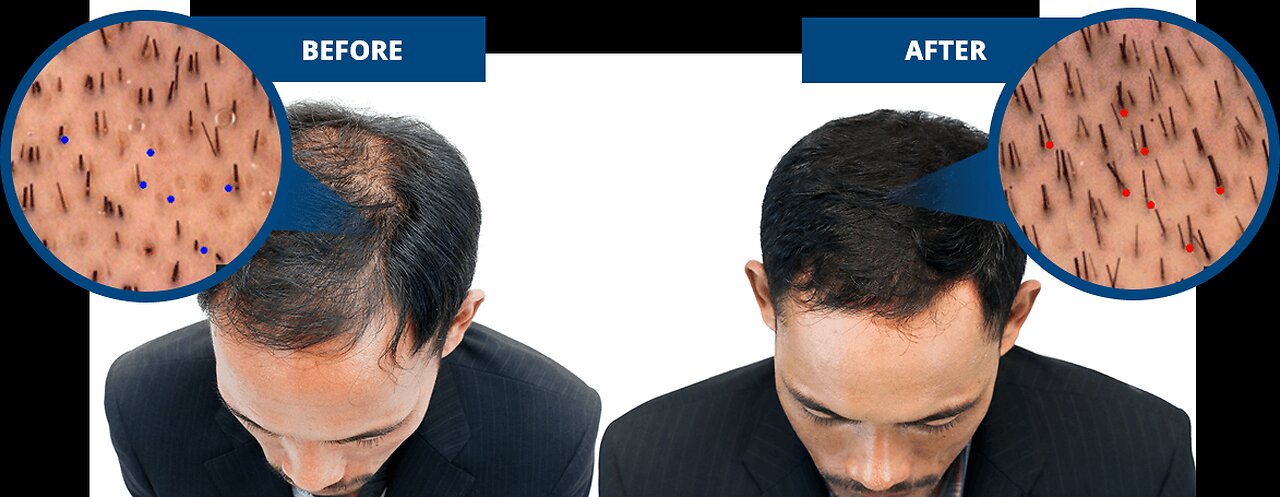Premium Only Content

Baldness - Exploring Nutritional and Medical Hair Loss Interventions
As of my last knowledge update in September 2021, I can provide you with a detailed description of common hair loss pills and treatments that were considered some of the best options at that time. However, please note that developments in the field of hair loss treatment may have occurred since then. Always consult with a medical professional before starting any new treatment regimen.
Hair loss, also known as alopecia, can occur due to various factors, including genetics, hormonal imbalances, medical conditions, and lifestyle factors. There are several hair loss pills and treatments available, both prescription and over-the-counter, that aim to promote hair growth and prevent further loss. Here are some of the commonly known options:
Finasteride (Propecia): Finasteride is an oral prescription medication that works by inhibiting the action of the hormone dihydrotestosterone (DHT), which is associated with hair loss in individuals with a genetic predisposition. It's primarily used to treat male pattern baldness. Finasteride can slow down hair loss and in some cases promote regrowth. However, it's important to note that it may have potential side effects, including sexual dysfunction and mood changes.
Minoxidil (Rogaine): Minoxidil is an over-the-counter topical solution available in various strengths. It's applied directly to the scalp and is available for both men and women. Minoxidil is believed to promote hair growth by increasing blood flow to the hair follicles and prolonging the growth phase of hair. It's often recommended to be used consistently over a long period for optimal results.
Dutasteride: Similar to finasteride, dutasteride is another prescription medication that inhibits DHT production. It's not approved by all regulatory agencies for hair loss treatment, but it's sometimes prescribed off-label.
Low-Level Laser Therapy (LLLT): LLLT involves the use of devices that emit low-level lasers or light-emitting diodes (LEDs) to stimulate hair follicles and promote hair growth. These devices can be in the form of combs, helmets, or caps that are used at home. LLLT is generally considered safe, but its effectiveness can vary among individuals.
Nutritional Supplements: Some nutritional supplements are marketed as hair loss treatments. Biotin, zinc, iron, and vitamins like vitamin D and vitamin E are often included in these supplements. However, the effectiveness of these supplements in treating hair loss can be limited if the hair loss is primarily due to factors other than nutritional deficiencies.
Platelet-Rich Plasma (PRP) Therapy: PRP therapy involves drawing a small amount of the patient's blood, processing it to concentrate the platelets, and then injecting the platelet-rich plasma into the scalp. The growth factors in the platelets are believed to stimulate hair follicles and promote hair growth.
Prescription Shampoos: Some prescription shampoos contain active ingredients like ketoconazole or selenium sulfide, which can help manage conditions like dandruff and seborrheic dermatitis that may contribute to hair loss.
Hair Transplant Surgery: In cases of advanced hair loss, hair transplant surgery can be considered. During this procedure, hair follicles from areas with healthy hair growth (often the back of the scalp) are transplanted to areas with thinning or no hair.
Spironolactone: Spironolactone is a prescription medication primarily used to treat conditions like high blood pressure and fluid retention. However, it is sometimes prescribed off-label for female pattern hair loss. Spironolactone works by blocking androgens (male hormones) and may help slow down hair loss in women.
Corticosteroids: Corticosteroid medications, available as topical creams, injections, or oral pills, can be used to manage inflammation and autoimmune-related hair loss conditions like alopecia areata. These treatments can help suppress the immune response attacking the hair follicles.
Oral Contraceptives: Some oral contraceptives with anti-androgenic properties can be used as a treatment for female pattern hair loss. They work by reducing the impact of androgens on the hair follicles. However, these medications should only be used under the guidance of a healthcare provider.
Hair Growth Serums and Topical Solutions: Alongside minoxidil (Rogaine), there are other topical solutions and serums available that claim to promote hair growth. These products often contain a blend of vitamins, minerals, amino acids, and botanical extracts that are believed to nourish the hair follicles and encourage growth.
Natural Remedies: Some individuals prefer natural or alternative remedies for hair loss. Essential oils such as rosemary oil, peppermint oil, and lavender oil are sometimes used topically to stimulate hair follicles. However, scientific evidence supporting their effectiveness is limited, and they should be used with caution.
Lifestyle Changes: Making lifestyle adjustments can also contribute to healthier hair. A balanced diet rich in vitamins and minerals, stress management techniques, regular exercise, and proper hair care can all support overall hair health. Avoiding tight hairstyles and harsh hair treatments can help prevent further damage.
Consultation with Professionals: Before starting any hair loss treatment, it's crucial to consult with healthcare professionals, such as dermatologists or trichologists, who specialize in hair and scalp health. They can accurately diagnose the cause of your hair loss and recommend appropriate treatments based on your individual needs and medical history.
Remember that there is no one-size-fits-all solution for hair loss, and what works for one person might not work for another. Furthermore, results from various treatments may take time to become noticeable, and consistency is key. It's also important to manage expectations, as some treatments might not result in a full reversal of hair loss, but rather a reduction in its progression.
Additionally, since my knowledge is based on information available up to September 2021, there might have been advancements or new treatments developed in the field of hair loss since that time. Always stay informed about the latest research and consult medical professionals to make informed decisions about hair loss treatment options.
It's important to emphasize that individual responses to these treatments can vary widely. Additionally, any hair loss treatment should be discussed with a healthcare professional to ensure that it's appropriate for your specific situation and to monitor for any potential side effects. If you're considering using any hair loss pills or treatments, consult a medical professional or dermatologist to receive personalized advice based on the most current information and developments in the field.
TO ACCESS FULL DETAILS CLICK THIS LINK : https://www.profollica.com/ct/685441
-
 2:42:52
2:42:52
TimcastIRL
8 hours agoTrump To Deploy National Guard To Chicago, Baltimore, Democrats Call To Resist | Timcast IRL
229K98 -
 3:22:30
3:22:30
Laura Loomer
9 hours agoEP141: Muslims Call For Political Assassinations At Michigan Palestinian Conference
56.5K37 -
 4:39:32
4:39:32
Barry Cunningham
10 hours agoBREAKING NEWS: PRESIDENT TRUMP IS GOING TO TAKE CHICAGO! LFG!!! (IT'S MOVIE NIGHT!)
98.3K65 -
 1:23:59
1:23:59
Man in America
12 hours agoTrump Demands Big Pharma Come Clean on Covid Shots w/ Dr. David Martin
59K44 -
 1:40:27
1:40:27
megimu32
8 hours agoOTS: Labor Day Sitcom Blowout - Tim, Ray, & Relatable Chaos!
46.1K5 -
 4:09:30
4:09:30
StevieTLIVE
8 hours agoWarzone Wins w/ FL Mullet Man
44.5K2 -
 1:04:01
1:04:01
BonginoReport
11 hours agoLefties Wish Death on Trump but He’s BACK! - Nightly Scroll w/ Hayley Caronia (Ep.125)
199K85 -
 3:18:28
3:18:28
Tundra Tactical
8 hours ago $8.15 earnedWe Survived the Military… But Not This Basement
41.2K -
 20:12
20:12
Clownfish TV
16 hours agoDisney Needs MEN Back?! They ADMIT Star Wars and Marvel are DEAD!
32.4K37 -
 1:37:00
1:37:00
Anthony Rogers
15 hours agoEpisode 381 - Tim Kelleher
22K1